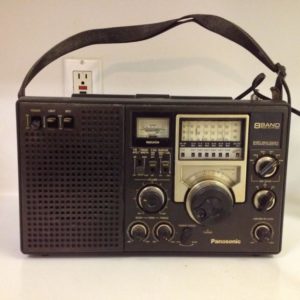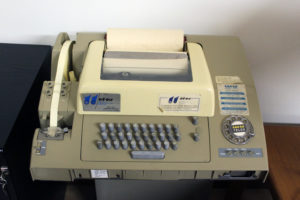
It recently occurred to me that I came by my geekish (and I use the term with great honor and reverance) nature naturally. My father was a B-29 mechanic in WWII. Not only did that keep him from getting killed on some south Pacific island, he was also involved in state-of-the-art technology of the time. The B-29 was a monstrously huge, powerful, beautiful airplane that required highly skilled personnel to keep flying. I’m very proud of my father for qualifying for such exalted, technically challenging, honest duty.
Dad show his geeky side in another way as well. He was passionate about fancy radios.
Dad would play with the shortwave band from time to time. He would tune in a station from Denver that would broadcast coordinated universal time (At the tone, the time will be 9 hours, eleven minutes coordinated universal time.”). My brother the Air Force pilot would give him beautiful Seiko watches in the 70’s he obtained cheaply overseas. Dad reveled in knowing that his watch was accurate to the second, and knowing that 24 hours later, the amazing Seiko would only be a few seconds off.
Of course, I used the time station to set my LED watch as well. That way I could count down to the exact second the classroom bell would ring.
That was the extent of his interest in shortwave, to my knowledge. But I would borrow his big fancy radio and spend hours searching for strange radio broadcasts that were literally coming from all over the world. In fact, I’m getting goose bumps just thinking about how thrilling it was to stumble onto the BBC, Radio Moscow, the Voice of America, and weird Morse code signals.
It was pretty wild hearing the Russian side (in English) of how the Vietnam War was going.

But I had just as much fun finding stations that just broadcast electronic noise. Much of the noise, I later learned, was telex data. Telex was a precursor to the internet that allowed the transmission of typed words among businesses and government organizations. The signals would be translated by telex machines into messages. The system was fast, cheap, reliable, and decidedly cool.
The Morse code broadcasts were lots of fun, too. I would transform myself into a secret agent who was getting his encrypted instructions via shortwave from some strange, exotic place.
It was great stuff to fuel a kid’s imagination, knowing that some of the signals were coming from lonely towers located in the middle of Siberia, or eastern Europe, or on an African mountain.
Shortwave radio is still around, of course, and bigger than ever. There are websites that are virtual radios, where you can tune to frequencies and listen via streaming audio. And shortwave radios have gotten cheaper and more sophisticated, like all other electronics.
However, the rise of the internet and the fall of communism has made shortwave less cutting-edge than it used to be. I remember feeling a little guilty listening to Russian shortwave! But the medium is still out there, and still heavily used.
Maybe it’s time for ME to buy a fancy multiband radio . . .